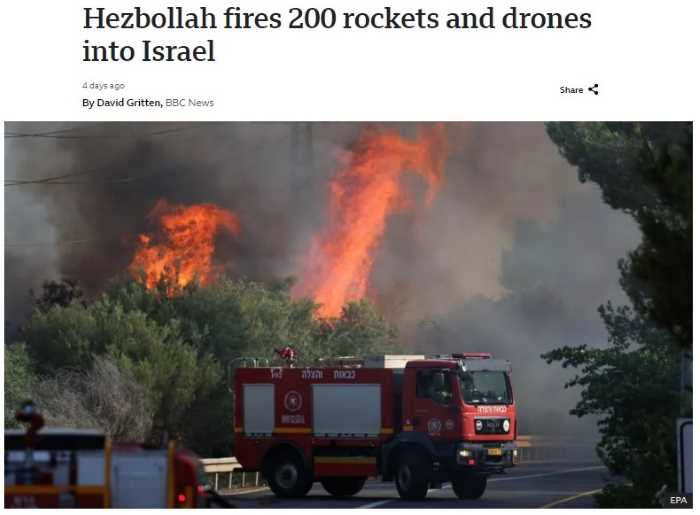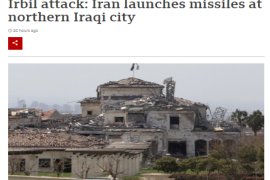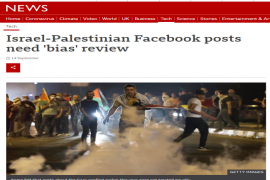On the afternoon of July 3rd the BBC News website published a report originally credited to David Gritten headlined “Israeli strike kills senior Hezbollah commander in Lebanon”. Later versions of that report added Hugo Bachega to the credits.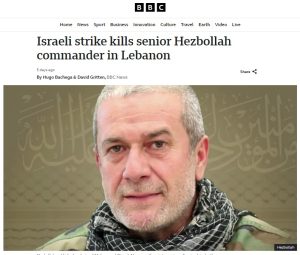
On the evening of July 4th the BBC News website published another report by David Gritten headlined “Hezbollah fires 200 rockets and drones into Israel”.
As has overwhelmingly been the case in BBC coverage of events on either side of the border between Israel and Lebanon since October 8th 2023 when Hizballah launched an unprovoked attack, those two reports are notable for:
- Promoting the notion of equivalence between a sovereign state and a terrorist organisation
- Ignoring the fact that UN SC resolution 1701 – according to which that terrorist organisation should not be operating near the border between Israel and Lebanon – has not been implemented since it was passed in 2006
- Airbrushing the failure of the UN force (UNIFIL) tasked with implementing that UN Security Council resolution to meet its remit.
The second report opens as follows: [emphasis added]
“The Lebanese armed group Hezbollah has launched more than 200 rockets and attack drones into northern Israel, in response to the killing of one of its senior commanders.
Israel’s military said one of its officers was killed in the barrage, which started a number of fires.”
Only in paragraph ten are readers told that Hizballah is a proscribed terrorist organisation. The portrayals in both reports fail to adequately clarify the scale and environmental impact of what are described as “a number of fires”. As reported by Ynet:
“The massive barrage caused major brushfires all along the north. Some 25 firefighting teams and 9 aircraft participated in the efforts to extinguish the fires prompting the police to close down major highways.”
Israel’s Nature and Parks Authority reported that those fires resulted in the burning of over 3,000 acres and that since the beginning of the year, around 25,700 acres including forests, nature reserves and grazing land have been burned in northern Israel.
The portrayals of the Hizballah commander eliminated on July 3rd (together with another terrorist) in both reports rely mostly on IDF statements:
“The Hezbollah commander killed in an Israeli air strike near the southern Lebanese city of Tyre, Mohammed Nimah Nasser, was one of the most senior figures in the group to have been killed in the conflict.
The Israeli military said Nasser commanded Hezbollah’s Aziz Unit, which is responsible for launching rockets from south-western Lebanon, and accused him of directing a “large number of terror attacks”.
It also described him as “the counterpart” of Taleb Sami Abdullah, the commander of another unit whose killing last month prompted Hezbollah to launch more than 200 rockets and missiles into northern Israel in a single day.”
The Times of Israel noted that:
“Several hours after the strike, the IDF confirmed that it had killed Nasser, who it said since 2016 commanded Hezbollah’s Aziz unit, one of three regional divisions in south Lebanon. The unit is responsible for Lebanon’s southwestern region, from the coast to the Bint Jbeil area, and has carried out hundreds of attacks against northern Israel’s upper and western Galilee amid the war.
According to the IDF, he is the second most senior Hezbollah commander it has killed amid the ongoing fighting alongside fellow regional division head Abdullah. Nasser previously commanded Hezbollah special forces, and was involved in numerous attacks against Israel, including the 2006 cross-border kidnapping of soldiers Ehud Goldwasser and Eldad Regev.”
That 2006 cross-border kidnapping started the Second Lebanon War.
The second report – which does not name the reservist officer killed or mention the three civilians injured – notes that the attacks by Hizballah had begun the previous day but does not clarify which regions were attacked: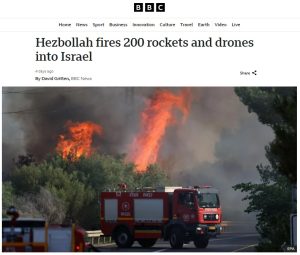
“The latest barrage, which followed one comprising 100 rockets on Wednesday afternoon, was one of the biggest so far in the nine months of cross-border violence which have raised fears of an all-out war.”
The narrative of equivalence between the sovereign country which was attacked on October 8th and the terrorist organisation which chose to carry out the attacks – despite knowing full well what would be the result – is promoted in a number of paragraphs in both reports:
“There have been almost daily exchanges of fire across the Israel-Lebanon border since the day after the start of the war between Israel and Hamas in Gaza on 7 October.”
“So far, more than 400 people have been reported killed in Lebanon, the vast majority of them Hezbollah fighters, and 25 people in Israel, mostly soldiers.”
“The hostilities have also displaced tens of thousands of people from border communities in northern Israel and southern Lebanon.”
Neither of the reports explain to readers that according to UN SC resolution 1701, Hizballah is barred from maintaining a military presence south of the Litani river (some 30 kms north of the border with Israel) or that the UN’s ‘peacekeeping force’ in Lebanon has failed in its mission to enforce that resolution since it was passed in 2006.
That omission is particularly notable in the second report, in which Gritten quotes a UNIFIL spokeswoman:
“A spokeswoman for the UN peacekeeping force in Lebanon, Unifil, said the exchanges were now extending deeper into both sides of the border, and called on both Israel and Hezbollah to show restraint.
“We’re very concerned… because any exchange, any incident, can escalate into something greater if there is a misunderstanding,” Kandice Ardiel told the BBC.”
The interview from which that quote is taken was aired (from 11:13 here) on the BBC Radio 4 programme ‘World at One’ on July 4th. In his introduction to the programme, presenter Jonny Dymond similarly promoted a narrative of equivalence which fails to clarify that one of the parties is a proscribed terrorist organisation that attacked a sovereign country:
Dymond: “Rockets fly back and forth across the Israel-Lebanon border. […] Two deeply hostile and well-equipped militaries face off.”
Throughout the interview UNIFIL’s deputy spokesperson repeatedly referred to “exchanges of fire” and both she and Dymond refrained from informing listeners that Hizballah initiated the current conflict. While explaining that some civilians in southern Lebanon had evacuated their homes, Ardiel failed to make any mention of the Hizballah assets located in many villages close to the border and Dymond did not raise that obviously relevant topic.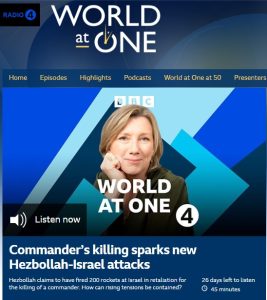
One of the questions posed by Dymond was as follows:
Dymond: “Your force is there as a monitoring and observing force. Do you believe it also acts as some kind of deterrent? Is that part of its aim?”
Ardiel: “I believe the presence of peacekeepers here shows the commitment of the international community, of the United Nations. We have troops here, peacekeepers – military peacekeepers – from 49 different countries. So 49 different countries have sent their troops here in support of security and stability in south Lebanon and I think that’s important.”
Contrary to Dymond’s claim, UNIFIL is not tasked merely with “monitoring and observing”. As explained at The Long War Journal:
“UNIFIL has roughly 10,000 troops stationed in southern Lebanon. Under UN Security Council Resolution 1701, passed in 2006, UNIFIL must ensure, among other things, that the area between the Lebanon’s Litani River and the so-called Blue Line (the de facto border between Israel and Lebanon, roughly 30 km south of the river) is “free of any armed personnel, assets and weapons other than those of the Government of Lebanon and of UNIFIL.”
The UN resolution also authorizes UNIFIL to “take all necessary action in areas of deployment of its forces and as it deems within its capabilities, to ensure that its area of operations is not utilized for hostile activities of any kind.”
Unfortunately, UNIFIL has utterly failed to fulfill this mandate.”
Not surprisingly therefore, Dymond had no comment to make in reply to Ardiel’s vacuous talking points concerning “security and stability” and failed to point out that for the past eighteen years “the international community” and the UN have completely failed to prevent a proscribed terrorist organisation from accumulating immense stocks of weapons and entrenching its presence in southern Lebanon– including with cross-border tunnels – literally under the noses of UNIFIL forces.
Ardiel later told listeners that UNIFIL urges “the parties to Resolution 1701 – Lebanon and Israel – to recommit to the resolution and to the cessation of hostilities to move forward to a political and diplomatic solution that will lead to long-term peace.”
Dymond did not bother to inform Radio 4 listeners that the current conflict is not between Israel and Lebanon or that it was initiated by a terrorist organisation which is carrying out attrition warfare, has no interest whatsoever in “long-term peace” and is in fact committed to Israel’s destruction.
These two written reports and this radio item once again demonstrate how the BBC is serially failing its audiences by neglecting to provide the full range of background information concerning the factors which have led to the current escalation of hostilities and what may well be the BBC’s next big story.
Related Articles:
MORE BBC FRAMING OF POTENTIAL ESCALATION ON ISRAEL’S NORTHERN BORDER
NASRALLAH’S CYPRUS THREATS NOT NEWS FOR BBC’S WILLIAMSON
MORE 1701 ERASURE IN BBC REPORTING FROM SOUTHERN LEBANON
BBC REPORT FROM SOUTH LEBANON IGNORES UNSC RESOLUTION 1701
BBC NEWS ONCE AGAIN ERASES UNSC RESOLUTION 1701 FROM A LEBANON STORY

